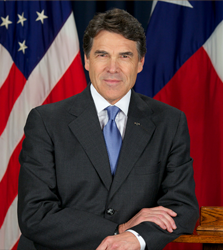
Will Rick Perry’s Feud With Donald Trump Get Him on the Debate Stage?
Ever since Fox News announced there would be only 10 candidates on the debate stage for the first Republican debate, contenders considered “on the bubble” have been trying to boost their national support in order to qualify. As described in this morning’s New York Times, Fox will rely on the five most recent national polls to determine who makes the cut:
To qualify for the debate each candidate must place in the top 10 “of an average of the five most recent national polls as recognized by Fox News” by August 4th at 5 p.m. Eastern Standard Time, according to a memo that Fox News sent to the Republican candidates.
One of the almost certain implications of the recent rise in support for businessman Donald Trump’s campaign is that by securing a spot on the stage for himself, he likely denies another candidate a spot.
But two news outlets have articles this morning suggesting that former Texas Gov. Rick Perry may actually be helped by Trump’s rise, or at least aided by his critiques of Trump, and that the attention garnered from the feud could fuel a rise in support for himself. Here’s The Washington Times:
Donald Trump’s ascendancy may reshuffle debate stage
Donald Trump’s entrance into the GOP presidential race has not only booted another candidate from the likely lineup at next month’s first sanctioned debate, but it’s also denying the laggers any oxygen to draw attention to themselves and try to climb the rungs to the top tier….
[W]ith Fox News only allowing the top 10 candidates, as determined by national polls, onto the stage for the Aug. 6 affair, and Mr. Trump locking up one of those slots with his meteoric rise, it means one of the other 16 major candidates will be left on the outside.
Right now, that looks like it would be Ohio Gov. John Kasich or former Texas Gov. Rick Perry, who are on the bubble, with former Sen. Rick Santorum, Louisiana Gov. Bobby Jindal, former Hewlett-Packard CEO Carly Fiorina, Sen. Lindsey Graham and former New York Gov. George Pataki rounding out the rest of the outsiders.
But Mr. Perry is hoping to use Mr. Trump’s rise to his own benefit, mounting a ferocious attack on the businessman as a way of building his own brand within the GOP.
How is that working for Perry? According to The Washington Post, fairly well:
Until yesterday, former Texas governor Rick Perry had languished behind his rivals in total mentions across traditional and social media. This week’s Washington Post-ABC poll, which Trump led with 24 percent among registered Republicans, put Perry at 4 percent. Perry knows that his attacks on Trump may guarantee him a spot in the first Republican primary debate next month.
Perry has had three spikes in mentions over the past two weeks. All were Trump related.
It began on July 16, when Trump suggested Perry should be required to take an IQ test before being allowed to participate in any GOP presidential debate. Two days later, Perry interest spiked again when he seized on Trump’s comments about John McCain, saying The Donald had disqualified himself to be commander-in-chief. Then there was the speech Wednesday.
According to the Post’s data, Perry had been averaging between 4,000 and 6,000 media mentions in the days before his first attack on Trump, vaulting him to around 12,500 mentions on July 16. Even though his mentions fell the following day, the fell to a level above his previous average, to around 7,500. The second and third spikes tied to Perry’s critiques of Trump saw surges to 15,000 and nearly 20,000 mentions.
The RealClearPolitics.com average of polls shows Perry in a fight with Ohio Gov. John Kasich for the final spot (both are currently at 1.8%, and in the event of a tie for 10th place in the polls relied upon by Fox both candidates would be allowed on the stage). Media mentions aren’t relevant to polls, of course, but it’s likely that having Perry's candidacy be more visible at this crucial juncture will help give him an edge, if not over Kasich, then at least over any of the other candidates trying to pass him for a spot on stage.



